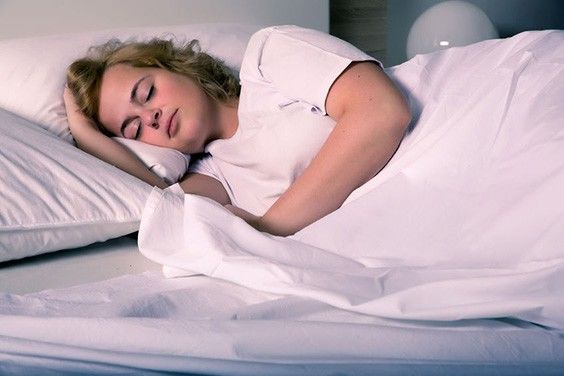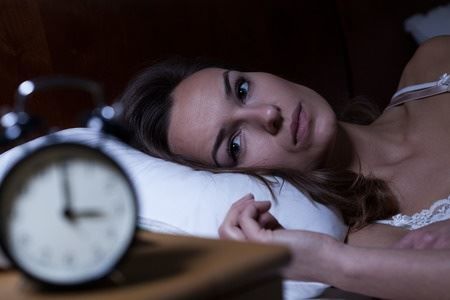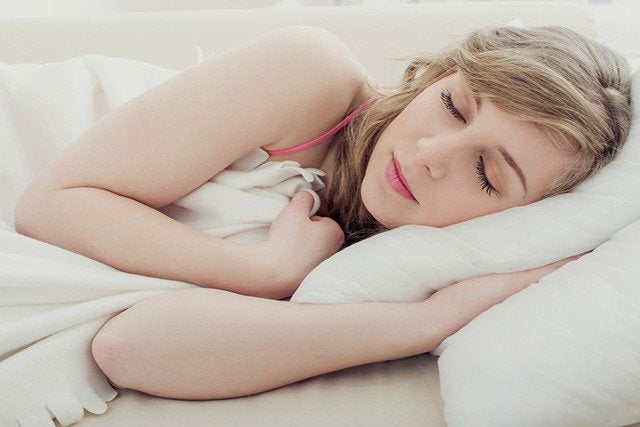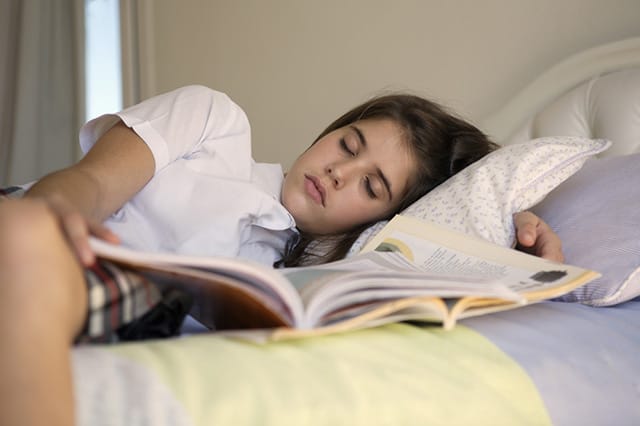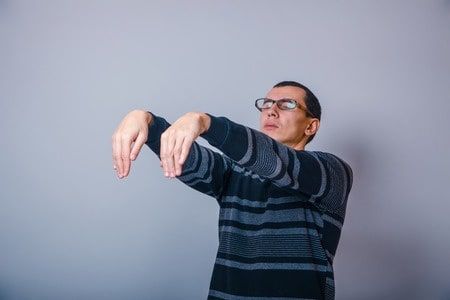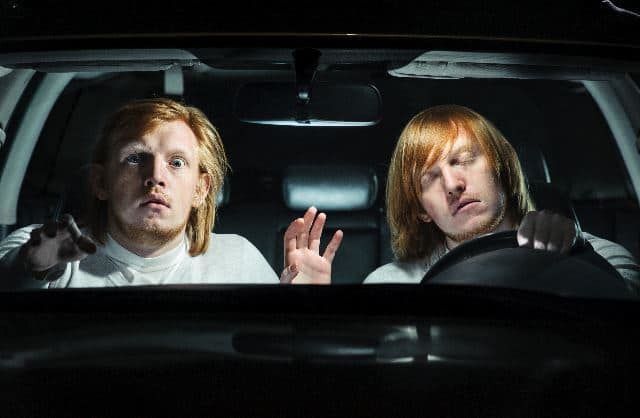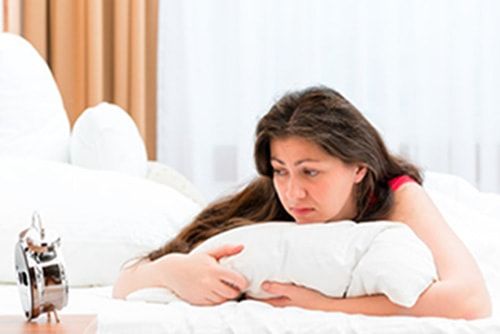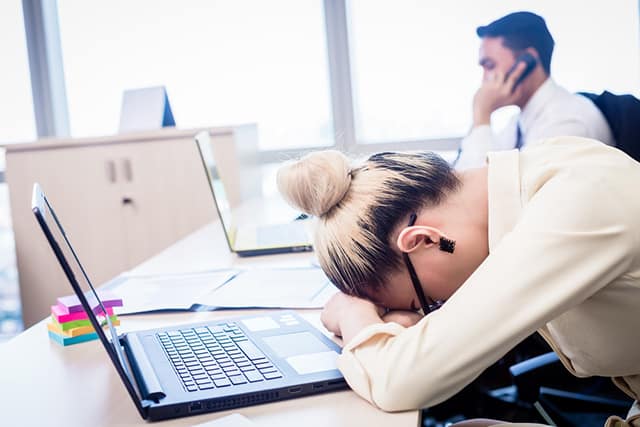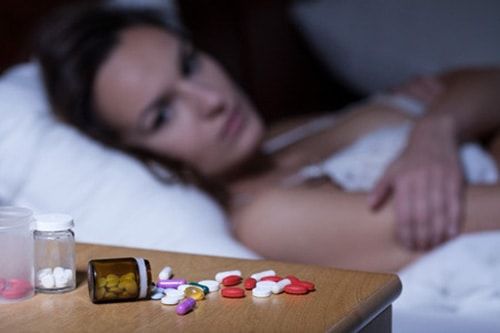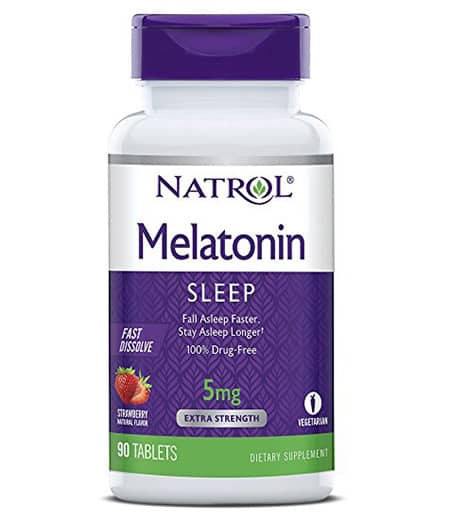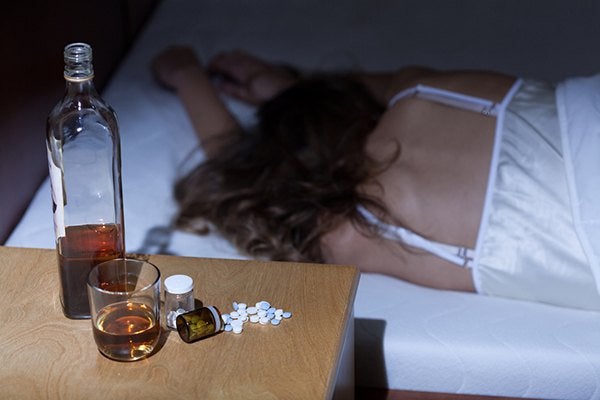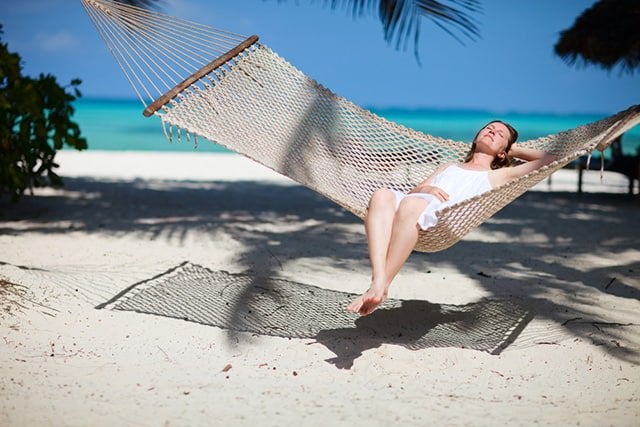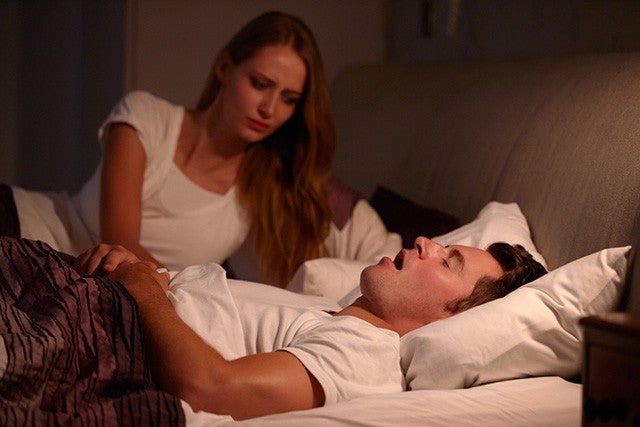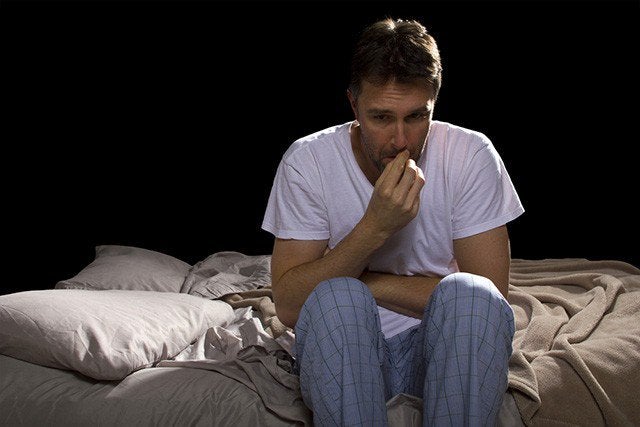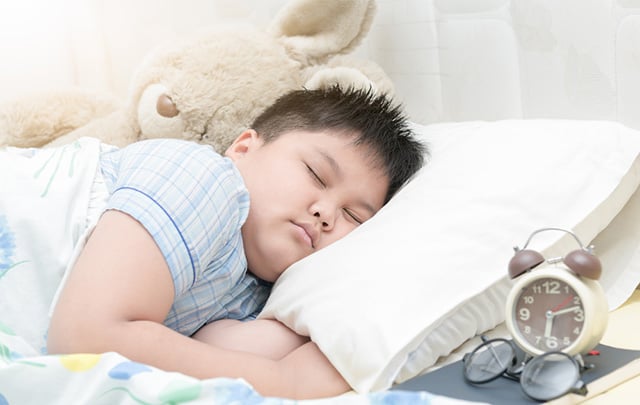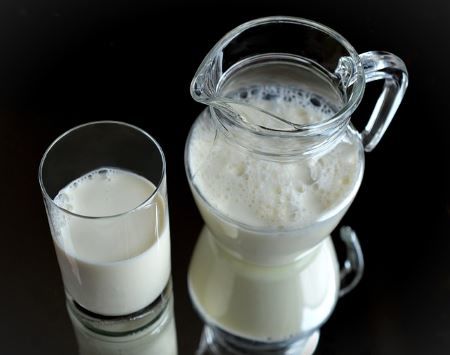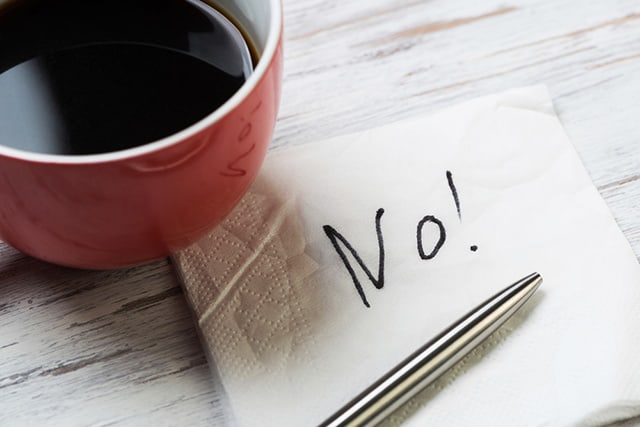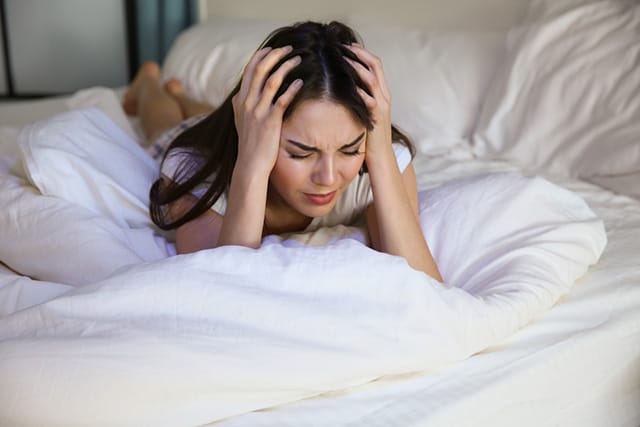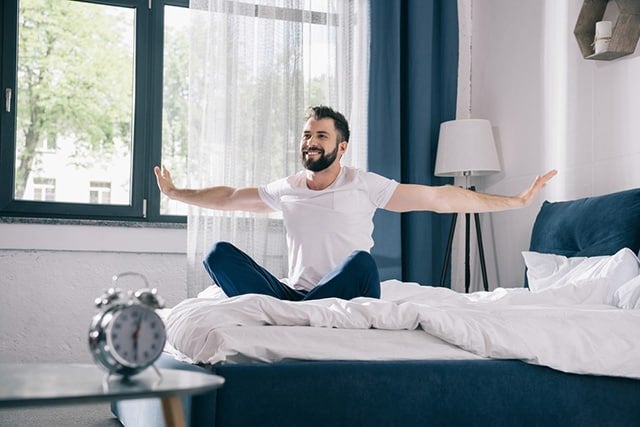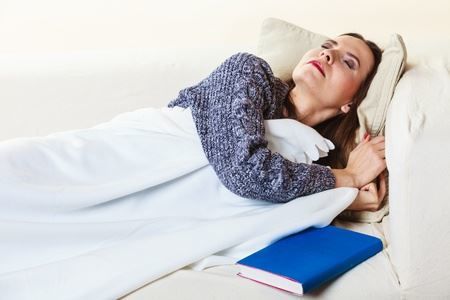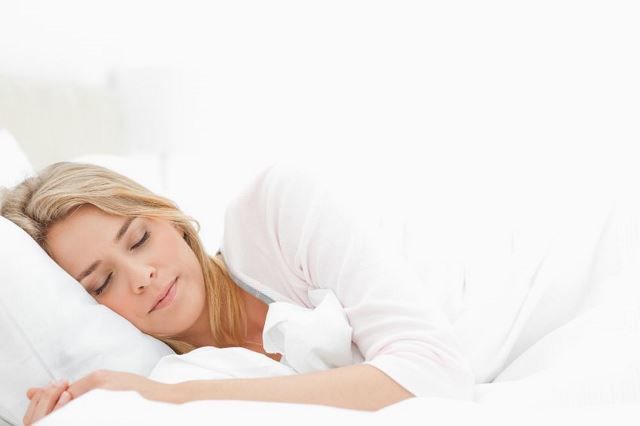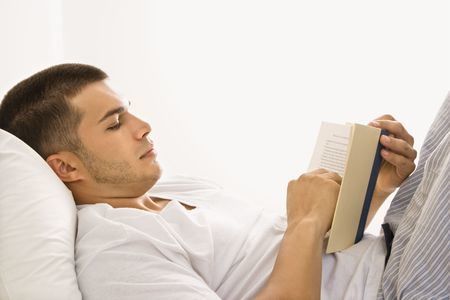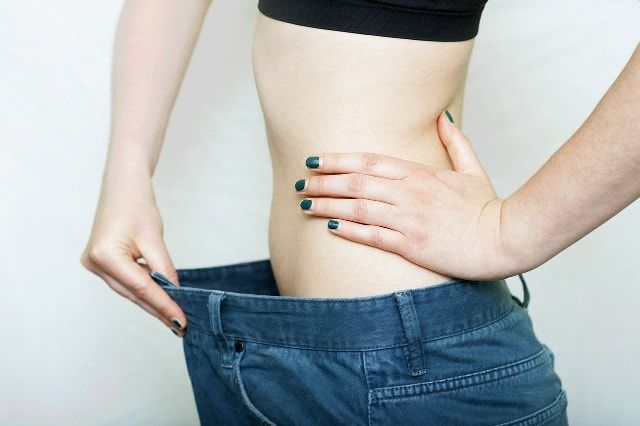Sure I lost a couple hours of sleep this week, but I’ll catch up on the weekend.
I’ll take a power nap and feel just fine.
Watching television will help me fall asleep.
These are just a few of the things we tell ourselves about getting enough rest. But if you really look at all the advice out there on how to make sure you’re well rested, you’ll find a lot of conflicting information. How do you know the right answers versus a bunch of fluff? What’s the hard fact, and what is open to interpretation?
If you’re confused and need to know how to get a good night’s sleep and feel rested every day, take a look at this comprehensive guide to debunking sleep myths. From snoozing your alarm to why we yawn, you can reference this resource to dig out the truth when it comes to sleep habits and needs. Here are some common – and some not so common – myths about sleep you should question before accepting as fact!
Sleep Myths vs. The Truth
So much mythology abound and float around regarding sleep, and one of the most common is that, as you sleep,you swallow upwards of 8 spiders a year. However, scientists who study these creepy crawlies are certain this just doesn’t happen. First, there is no prey in your bed, and an arachnid has no reason to be drawn to your bed without a promise of food. Additionally, your warm breath is a deterrent to spiders. Between that and the general ‘vibration’ of your body as you sleep, you’re one big danger sign to eight-legged pests.
So why is this such a pervasive belief? An article was published in 1993 by playful journalists, filled with ‘fact’s she made up in order to prove just how gullible the public could be when it came to trusting the media. In this fictional work, she stated that the average person “swallows eight spiders per year.”
We may not know the origin of every sleep myth, but we can debunk plenty more! Here are some common myths and facts for you to consider.
Catching Up on Sleep
Myth: I can catch up on sleep on the weekends.
Fact: While you may feel more rested after a long sleep, this effect is temporary.
If you’ve had a rough week – or maybe several – you’ve probably told yourself over and over again that you’ll sleep in on Saturday or Sunday and ‘catch up’ on some zzz’s. Unfortunately, that’s not how it works. You’ll probably find that a few extra hours of sleep on a weekend has you popping out of bed, feeling refreshed and ready to face the day in a way you haven’t felt in a while. But it’s temporary, so don’t get used to it.
The fact is, trying to catch up on sleep doesn’t improve performance later. In fact, while you might feel good in the morning, that likely won’t last more than 6 or so hours, at which point your reaction time starts to slow. And it can suffer – with your responses up to 10 times slower than normal! According to Women’s Hospital, you’re accumulating a ‘chronic sleep debt’ and there’s no way to pay it back.
Age and Sleep
Myth: The older you get, the less sleep you need.
Fact: Sleep needs don’t change that much as you age.
Just because older adults don’t get as much sleep due to interruptions during the night and a natural shift in sleep pattern that has them waking earlier doesn’t mean they actually need less sleep. As a matter of fact, however much you sleep when you’re 35 (to actually feel properly rested) is how much you should aim to sleep when you’re 75.
What typically happens, however, is that underlying conditions and medication get in the way of sleep and cause disruptions during the night or make it harder to fall asleep. Even higher pain levels can affect how much you sleep, and the older you get, the more susceptible you are to sleeping disorders. All that means is that you might have to work harder to get the sleep you need.
TV and Distractions
Myth: Watching television will help me fall asleep.
Fact: The flickering light is more of a distraction than hypnotic.
Between TV and other electronic devices such as tablets, cell phones, and laptops, watching a flashing electronic screen in some form or fashion is something 95% of Americans do before falling asleep. With that in mind, it’s a wonder we don’t have a sleep crisis on our hands!
Actually, watching television – or other devices – can relax you and slow down your mind after a long day. However, you have to take it in moderation. Getting too involved in the entertainment often keeps you up later when you should be sleeping. Also, the light emitted from these devices can mess with your circadian rhythm. The lighting is bright enough to trick your brain into thinking it’s still daylight, which causes it to halt the production of melatonin, which is a hormone that helps you sleep.
In the end, even if you do avoid these pitfalls, you shouldn’t fall asleep with any of these devices running. The flashing lights are a distraction and will continue to rob you of solid sleep, no matter how comforting they seem. If you can’t fall asleep in silence, try music, which doesn’t have a backlight and opt for something soothing, such as classical or meditational varieties.
Teenagers and Sleep
Myth #1: Teenagers are lazy.
Myth #2: Teenagers are irresponsible and don’t go to bed early enough, which is why they fall asleep in class.
Fact: There are biological explanations for teenagers and their sleeping habits.
This goes back to the circadian rhythm. Much like hormones and growth and everything else, the circadian rhythm goes haywire right around the onset of puberty and stays erratic through most of the teen years. First, take into account the occurrence of what’s called delayed sleep phase syndrome, which can be blamed for teens keeping late hours and wanting to sleep in. This common condition in teens means that melatonin doesn’t get produced until 2 to 3 hours later than the average adult, and the body stops production 2 to 3 hours later.
Now, take into account the early hour at which school starts. It forces teens to get up before their bodies are ready. Therefore, they experience a natural sleep deprivation that can cause them to fall asleep in class, especially since (as mentioned above) there is no way to catch up on lost sleep. Bear in mind, too, that teens who are tired all the time don’t perform as well in class. Some schools have adjusted start times to accommodate these needs, while others offer a ‘delayed start’ for students who don’t need as many credits to graduate.
Sleepwalking
Myth: You should never wake up a sleepwalker.
Fact: It might actually be better for the sleepwalker to wake him up.
Did you know that sleepwalking used to be associated with possession by demonic entities? Of course, that’s not necessarily the case today, but for some, sleepwalking is a real concern. What shouldn’t be a concern is waking someone who is sleepwalking. You will not cause a heart attack, and though the walker may be a little startled or unsettled, you may end up doing them a favor.
Some people don’t just walk in their sleep. Eating uncontrollably, leaving the house, climbing on things, and even driving have been seen in dangerous cases of sleepwalking. Walking around while asleep may seem harmless, and the idea that you’re going to scare the sleepwalker to death might seem like a good reason not to disturb them. But really, the chances of death are much higher in that unconscious state!
Amount of Sleep
Myth: Everyone needs 8 hours of sleep every night/You can get by with as little as 4 hours of sleep a night.
Fact: While there are general rules of required sleep, no two individuals are exactly the same.
It’s long been a recommendation to get ‘eight solid hours of sleep’ every night. While this sounds ideal, it’s not necessarily the case for every individual. It’s a nice average to keep in mind when figuring out how much sleep you need personally. As with height, weight, hair color, eye color, etc., the amount of sleep needed is different for everyone. A good way to think about it is that the average adult needs somewhere between 7 and 9 hours of sleep (we won’t count children since newborns need between 16 and 18 hours of rest every day).
By the same token, it’s very rare that anyone can get by on a mere 4 hours of sleep every night. While it is possible, as scientists have identified a gene that allows people to perhaps get by on a fraction of the usual amount of sleep required, they’ve also noted that this probably applies to no more than 2 percent of the population. Otherwise, you’ll just end up suffering from sleep deprivation.
Napping
Myth: Daytime naps are useless.
Fact: According to NASA, naps can be life-altering.
Taking a nap during the day gets a bad rap, especially in western civilization. After all, there’s a reason why some areas of Europe still keep a schedule that allows for a midday ‘siesta’. Taking a nap during the day is often viewed as a lazy practice in American society, something for children to do, and thus, we tend to let ourselves lose more and more sleep. While we can’t catch up from lost snoozing on the weekends, we could keep up with our need for rest by taking a nap during the day.
NASA studied pilot behavior and compared those who didn’t take a nap to those who slept for 25 minutes. They discovered that those who didn’t nap nodded off 5 times as often as those who took a nap during their shift. If you don’t take a nap late in the day and you don’t sleep too long, a nap can be very refreshing and keep you alert during the day, helping to improve your overall performance.
Sleep Aids
Myth: Sleeping pills don’t hurt anything.
Fact: New studies show sleep aids may be more than just addictive.
So, you’ve been having a lot of trouble sleeping, and you spoke to your doctor, who prescribed some medication to help you get the rest you need. You’re not alone – about 10 percent of the population is on prescription sleeping pills. The problem is, these medications – ‘hypnotics’ like temazepam – can be very habit forming. Breaking any sort of addiction can be difficult and dangerous, and since these are only meant to be as short-term aids and not long-term solutions, you need to break the habit.
This is of even greater concern now that the use of these particular drugs is now linked to significantly higher risks of cancer and death. While they may offer a ‘quick fix,’ it might not serve a good enough purpose when you consider the long-term effects.
Sleep Aids #2
Myth: Natural and over the counter sleep aids can’t hurt me.
Fact: All sleep aids should be used with caution.
In order to avoid prescription medications, many have turned to natural sleep aids. Melatonin, kava kava, and valerian root are just a few choices. While these appear to be safer than chemical medications, there are still concerns about their use, especially under certain circumstances. For example, valerian root has been used for centuries but can cause dizziness and lethargy in the morning, making it more difficult to function properly. And kava kava may cause liver or kidney damage in some people. Always consult with your doctor before taking one of these supplements.
Similarly, over-the-counter sleeping pills are generally offered with safe amounts of relatively safe ingredients. However, some of these are just as strong as prescription meds, and you should take them with caution, as you would with any other medication. Also, these aren’t meant to be a long-term solution and should be used sparingly.
Drinking Before Bed
Myth: A nightcap/adult beverage will relax you and make it easier to fall asleep.
Fact: In the long run, this could make it harder to fall asleep and stay asleep.
Whether it’s wine or whiskey, alcohol is known for its natural sedative properties. But it also has a lot of properties that work against sleep. While you might snooze faster after a beer, your sleep will get lighter, and you’ll have trouble staying asleep, waking up frequently. This is in relation to the way alcohol affects sleep through the protein channels that control sleep function and timing, interrupting deep sleep.
Workout Before Bed
Myth: Exercise before bed will wear me out and put me to sleep.
Fact: Exercise before bed will wake you up and keep you from sleeping.
Exercise can certainly expend energy, which in turn, would make you more tired, physically and mentally- but not right before bed. In fact, because exercise awakens endorphins, which are stimulants, it’s more likely that you’ll be wide awake after a good 30-minute exercise routine. Try exercising in the morning to get your day started or midday when you feel like you’re starting to fade so that you get the boost to make it through the day. But don’t do too much and get too sore or exercise too close to bedtime, or you’ll never get to sleep!
Busy the Mind
Myth: Counting sheep will help ease the mind to a rested state.
Fact: Counting sheep is just another distraction.
In a sleep study, patients who were asked to count sheep took 20 more minutes than those who imagined relaxing on a beach to fall asleep. It seems that the boring task isn’t worthy of lulling you to sleep. In fact, the repetitive gesture actually distracts you from other thoughts that could be more calming and keeps your mind active for no reason when it should be fading into unconsciousness.
Sleep Interruption
Myth: Snoring is no big deal.
Fact: Chronic snoring could be a sign of another underlying problem.
About one-third of Americans have issues with snoring at least a few nights each week, and while you probably think it’s harmless, it could be signs that something else is wrong. Sure, it could be related to a stuffy nose from a cold or allergies, but if this is a chronic condition, and the snoring is loud, it could be a sign that you have OSA – obstructive sleep apnea. The condition isn’t just bothersome; in some cases, it can even be deadly, considering it’s a ‘pause’ in breathing that can last more than a full minute. If you have severe snoring issues, be sure to speak to your doctor about it and try to resolve the issue.
Night Terrors
Myth: Night terrors are no different than general bad dreams.
Fact: Night terrors are a completely different occurrence than nightmares.
Nightmares can be brutal on the psyche, but they don’t even begin to touch how disturbing a night terror can be. Sadly, night terrors most often affect children, though, they can definitely continue into teenage and adult years. Most frequently, a night terror attacks during a slow wave sleep, which is typically at the beginning of a night’s sleep. Night terrors can present as a psychological, physiological, or emotional terror, and the individual usually wakes up in a state of fear or panic. Sort of like a weird form of paralysis.
In many cases, the person having the night terror doesn’t recall the episode or doesn’t recall what sort of imagery and dream state that may have sparked the fear. Doctors and scientists conjecture that night terrors are caused by partially waking during the slow wake state of sleep for no identifiable reason. In most cases, children outgrow these instances, which also differs from nightmares.
Kids and Sleep Apnea
Myth: Kids never suffer from sleep apnea.
Fact: More and more children are being diagnosed with this condition.
Until recently, it seemed that obstructive sleep apnea (OSA) was a condition mainly suffered by adults and linked to health conditions that are more common in adults. However, this airway obstruction that disturbs the ability to breathe while sleeping – which affects about 12 million Americans – has become more prominent in children.
The condition is often linked to obesity, and with the increased incidents of chronically overweight Americans, the number of cases has continued to rise. This is true in children, as well, especially in the last ten years, as obesity has become something of a crisis in youth.
Food Issues
Myth: Eating turkey is going to put you to sleep.
Fact: It’s all about quantity, not substance.
Yes, turkey contains tryptophan. Yes, tryptophan triggers the production of serotonin. And yes, serotonin makes you sleepy. So, the popular opinion is that eating turkey will put you to sleep. Interestingly enough, what most people don’t know is that turkey has no more tryptophan than other meats, including beef and chicken.
So, step back for a minute and consider the quantity of turkey consumed during a Thanksgiving dinner. That’s a rather large amount compared to the usual serving. Now, add to that a very large infusion of carbohydrates from mashed potatoes, yams, stuffing, and a table full of other treats. Oh, and don’t forget imbibing, for those who enjoy a little wine with their dinner to celebrate. Taking into account that we have a natural dip in wakefulness in the afternoon per our circadian rhythm, it’s no wonder the family seems comatose after the holiday meal!
Dairy and Spicy Foods
There are actually foods that will help you sleep. Learn more here.
Myth: Eating cheese [or fill in the food] too close to bedtime will cause nightmares.
Fact: Food doesn’t affect our dreams, but it may have a negative effect coupled with certain meds.
Some say cheese, others say peppers, sausage, spicy foods, or something else. But everyone has an idea of a food you eat before bed that gives you nightmares. The truth is, you shouldn’t eat within 3 hours of going to bed at all for good digestive health, and some foods are worse than others for your digestive system, especially right before you lie down. Cheese and spicy foods can definitely cause a restless digestive tract, but what about nightmares?
Scientists have found no link between food and dreams. However, the myth may have come from a reaction between MAOIs and tyramine. The former is a particular type of antidepressant that some people take, and the latter is a compound that you find in high concentration in several aged cheeses. When combined, these two have actually caused fatal reactions in patients.
Milk
Myth: A glass of warm milk soothes me to sleep.
Fact: Carbohydrate-rich foods help soothe you to sleep.
A warm glass of milk may feel soothing, and the same myth about turkey and tryptophan might pervade. However, the truth is that, without other carb-rich foods to trigger the production of insulin in the body, tryptophan can’t do anything to help with the production of serotonin. So, the consensus is that milk – warm or otherwise – doesn’t do anything physiologically to induce a better night’s sleep. More poignantly, however, it could just be a soothing thing psychologically that helps people fall asleep, an old habit from childhood when Mom or Dad would bring you a warm glass of milk before bed. Since this is only harmful if you have an allergy or intolerance to lactose, feel free to indulge!
Caffeine
Myth: If you have insomnia, you need to completely remove caffeine from your diet.
Fact: Cutting off caffeine completely can be a problem for anyone.
Not everyone knows how caffeine actually works. It’s a stimulant – the most commonly used in the world – that increases activity for the nervous system and actually blocks the receptors in the brain that cause you to get sleepy. It can increase the level of dopamine in your body, which can result in a bit of a euphoria, and it also increases the production of adrenaline. On the negative side, it can also increase the stress hormone, cortisol. All of this means it can seriously wreak havoc on your sleep if not consumed with care.
But there’s no need to remove it from your diet just because you can’t sleep. In fact, new research shows that regular coffee drinkers are less likely to end up with serious conditions like Parkinson’s and Alzheimer’s. In addition, caffeine can create a dependency, and cutting it ‘cold turkey’ can lead to serious repercussions with symptoms like tremors, headaches, and irritability as you literally ‘detox’.
If you’re experiencing insomnia and think caffeine might be a culprit, cut back slightly on the quantity you consume and make sure you cut off caffeine later in the day. Try to keep your intake centered around morning and don’t imbibe beyond early afternoon. This may help you ease into sleep with less trouble.
Early to Bed…
Myth: Going to bed and waking up early is healthier.
Fact: It’s not about when you sleep but about how you sleep.
Several historical figures touted that early risers were healthier, smarter, and overall happier, including Aristotle, the Greek philosopher, and Benjamin Franklin, the scientist and a founding father of the United States. While there are people who are much more productive in the early morning hours, this doesn’t hold true across the board and literally has no impact on intelligence.
A comparison between larks and owls – one, morning riser and one, night creature – showed that when tested in the morning, both groups performed equally well. However, if tested in the evening, larks performed below the level of owls. What does this prove? It seems to show that performance is more based on getting adequate rest and being prone to morning or evening. If you’re a morning person, don’t switch it up. If you thrive later in the day, you should stick to your schedule.
Drowsy Driving
Myth: If I get tired while driving, I just need to blast cold air/roll down the window/crank up the music.
Fact: This relief is instantaneous, but you’ll be back in a fog in no time.
Drowsy driving is a horrible epidemic, causing tens of thousands of accidents every year. Because we tend to be tired frequently based on poor sleeping habits, sleep disorders, and just trying to do too much, more than half of Americans admitted to driving drowsy in 2005. A popular ‘cure’ is rolling down the window or turning up the volume on the stereo to help stimulate you into full wakefulness. And a blast of cold air or an assault on your ears may have an immediate effect.
However, studies show that effect wears off quickly – in as little as a few minutes. Ultimately, the best solution for drowsy driving is sleep. If you’re on a road trip, pull over and nap. Coffee also works as a real stimulant to help you stay awake. And even though it’s not a popular idea because of other health risks, even nicotine can have a more lasting effect than rolling down the window.
Brain Activity
Myth: Sleep is passive rather than active.
Fact: The body and mind are anything but ‘passive’ during sleep.
Maybe it’s not society’s fault that sleeping is believed to be the body’s time to rest and just sort of ‘shut down’, considering that this was the explanation given by scientists for years. But the truth must be revealed, and that truth involved a high level of activity in the body and mind while we sleep. In fact, there are certain activities in the brain that literally increase while we catch a snooze.
The body’s endocrine system kicks into high gear while you sleep, producing things vital for growth in children and for a healthy immune system for everyone. Certain brain waves go into overdrive, and even dreaming is essential to help build healthy neural connections that keep our brains functioning on par. It’s obviously not a ‘quiet’ time for our bodies, and we can suffer from not getting enough sleep because of the necessary processes that happen while we’re still and unconscious.
About REM
Myth: You only dream during REM sleep, and some people don’t dream at all.
Fact: Dreaming is a complex process, and no one is exempt.
There are 5 sleep stages throughout the night, and one of those is REM sleep – rapid eye movement. It’s pretty well known that we dream during REM sleep. In fact, studies show that being woken during this cycle allows for more vivid recall of dream details. It’s also believed that the dreams during REM sleep last longer and tend to have some complexity, sometimes even becoming strange and even disturbing in their creative design.
But dreaming also occurs periodically outside of REM sleep, a discovery touted more recently. Think about the time between wakefulness and falling asleep, during which you might drift a little and feel almost like you’re hallucinating. You may still be somewhat aware of reality around you, but it’s slightly altered, and you may hear or see or smell things that aren’t actually there. The imagery and sounds during this period are another form of dreaming, and it can happen on transitioning back to being awake as well. Even in the middle of the night, you could experience shorter dreams that you may not recall as you do the more intense dreams of REM sleep.
Dreaming
Myth: Dreaming isn’t important.
Fact: Depriving someone of dreams could be detrimental to health.
While the debate continues as to what the actual reason is for dreaming, several theories come into play, many backed by scientific evidence. Dreaming helps with consolidating the memories we have, moving short-term memories to long-term cataloging. It also exercises the nervous system during development of neural connections and keeps the brain fresh. Some believe that dreaming plays an important role in the human need for wish fulfillment, allowing us to live the lives we can’t in reality.
While dreaming occurs at other times, it seems that REM sleep and dreaming is vital to the health of humans, based on a study in which rats were denied REM sleep. Many of the rats died within 2 to 3 weeks of being forced to awaken without REM sleep. This hasn’t been tested conclusively in humans but gives insight into how important the stage of sleep – and the ability to dream – really is for us.
Tricking Your Brain to Sleep
Myth: If you can’t sleep, you should just lie there until your brain slows down.
Fact: Lying in bed may not solve anything if you experience problems falling asleep.
If you’re finding it difficult to fall asleep, or you’re waking up in the middle of the night and having trouble relaxing back into slumber, you’ve probably been told to just ‘ride it out’. Unfortunately, this could be bad advice. Lying in bed awake can actually cause your mind and body to automatically stop associating your bed with sleep, making symptoms of insomnia worse. This includes participating in other activities in your bed on a regular basis, such as reading or watching television.
It’s recommended that you not spend time with books and electronic devices in bed. In addition, if you find that you’re lying awake with no sleep in sight, or something called sleep maintenance insomnia, you should consider getting up. While it seems counterintuitive, doing some light activity that isn’t stimulating may help you return to that ‘sleepy’ state so you can fall asleep. You can also try meditation, soft music, and breathing exercises. The recommendation is that you should never just lie there awake for more than 20-30 minutes without taking additional steps to keep your body’s circadian rhythm from falling apart.
You may want to read: Some Solutions to Help You Sleep
Weight Control
Myth: Less sleep means a thinner body.
Fact: Not getting enough sleep could produce the opposite effect.
It might make sense, right? If you’re sleeping less, you’re more active, so you’re going to burn more calories. Even by being awake, you’re burning more calories, right? Not necessarily. Sleeping a certain amount is actually the reason we have natural appetite suppressants in our bodies, and lack of sufficient sleep can actually cause your body to produce more chemicals that increase your appetite. Both of these problems can lead to gaining weight, the exact opposite of your intentions.
A study showed that hormone levels were affected significantly with lower levels of leptin in the body resulting in the bodily systems going into starvation mode and clinging to calories rather than letting the metabolism burn through them appropriately. This increased lethargy, which reduced caloric processing even further and caused rapid weight gain, as well as other negative side effects.
Conclusion
Before you decide to believe anything you hear about sleep, do your research. Listening to all the myths out there could cause more harm than good when you’re trying to improve your sleep habits and feel more rested. Above all else, consider speaking with your doctor if you feel you have a serious problem or a sleep disorder so you can get the proper treatment. Being tired all the time has serious, harmful, and even deadly repercussions in some circumstances.
Because sleep is vital to the rest of your health, make sure you have a comfortable sleep environment with good bedding and a temperature-and-sound level conducive to restfulness. Try to leave the stress outside and really relax. This can make a world of difference and even help reduce how much stress you experience with every little thing during waking hours!
